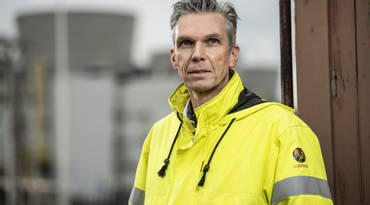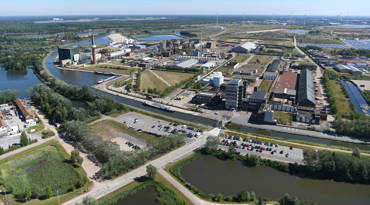Zinc producer Nyrstar is one of our country’s major consumers of electricity. The sites in Balen and Pelt account for approximately 1.5 per cent of Belgium’s electricity consumption, which is comparable with a city like Leuven. Despite this high level of consumption, Nyrstar poses no threat to the security of supply of our energy grid. On the contrary, Nyrstar helps stabilise the price of electricity in a sustainable way.
Zinc production essentially involves the step-by-step refining of ores containing zinc and secondary zinc oxides from the recycling of galvanised steel.
‘During the first stage of the process, we produce a lot of heat that we reuse during the second stage of the process. It is not until the last stage – electrolysis – that we use external energy. We require a huge amount of electricity for that,’ says Philip Eyckmans. In his capacity as Global Category Manager Energy, he is responsible for the global procurement of energy for Nyrstar.
However, that high electricity consumption does not affect the security of supply of our energy grid. ‘Our power consumption will never disrupt the electricity network,’ says Eyckmans. ‘For decades, the network operator has been able to shut down our electrolysis if there is an incident within the grid.’
Flexible production
Nyrstar has also invested heavily in a production process that can be adapted quickly and easily. ‘The start of the energy crisis in 2021 helped us become really flexible. Today, we are able to scale our production up or down in real time depending on the availability of wind or solar energy.’
More than half of the electricity used by Nyrstar in Belgium comes from renewable sources. ‘Approximately 15 per cent is actually produced at our sites; the rest
we buy in. There are wind turbines at both Balen and Pelt as well as a solar farm. The 100-megawatt peak solar farm in Balen is still the largest in Belgium. No more wind turbines can be added but there is still room for solar energy,’ says Eyckmans.
Stable prices
That flexible production is a good thing for consumers too, he says. ‘By varying our production, electricity prices remain stable. In the summer of 2022, we had extremely high electricity prices. Back then, we reduced our consumption by approximately one hundred megawatts. Had we not done that, the demand for electricity at those peak times would have been even higher and the price would have gone up even more.’
50% More than half of the electricity used by Nyrstar in Belgium comes from renewable sources.
In fact, production at Nyrstar is still flexible. ‘Because even if prices go down, sometimes they are still too expensive and so we reduce our production. That way, we can ensure that those price increases are limited for everyone.’
Europe is pushing very hard to find solutions to the potential overloading of the electricity grid in the event of high solar and wind energy production. Our virtual battery provides a solution to this.
Philip Eyckmans,Global Category Manager Energy at Nyrstar
Virtual battery
It made Nyrstar realise that there was potential in this method of production. ‘We can reduce our costs and it is a good thing for society. Therefore we are now working on a very specific project: the virtual battery.’ Nyrstar wants to build extra electrolysis capacity for this. ‘It should allow us to produce more when the amount of sustainable electricity being produced is high and prices are low.’
Not only will that require investment in extra electrolysis capacity, but it must also be possible for the by-product of zinc production – zinc sulphate – to be stored in buffer tanks. A significant but viable investment, Eyckmans believes.
European solution
The project is currently in the study phase as there are still a number of obstacles. ‘First and foremost, we need reinforcement for the electricity grid. That is not available at the moment but we are in the process of negotiating a contract without guarantees with Elia. Suppose that there was suddenly a high demand for electricity in the region at a time when not much renewable energy was being produced, then we would not have to buy in as much.’
Nyrstar is also counting on the necessary support from the government, via subsidies or otherwise. ‘Europe is pushing very hard to find solutions to the potential overloading of the electricity grid in the event of high solar and wind energy production. Our virtual battery provides a solution to this. Elia thinks so too, and it uses us as an example of how to manage the problem.’
Level playing field
Finally, the price of electricity must also be competitive. ‘Zinc is a commodity product; it is made
all over the world. If we have much higher costs in Europe than the rest of the world, there is a risk that production here will disappear. I don’t believe that there is any region in the world where non-ferrous metal production is more important than here. The whole ecosystem of supply, production and distribution is great.’
Therefore, European countries should have a policy to keep the price of electricity competitive and possibly absorb some costs. ‘We have seen countries like Germany and France go quite a long way with this. Belgium and Flanders are doing their best to follow suit and it is really important that they continue to do so. We are a small country with less money than these big countries. Without government support, it will not work.'
'The only way that the energy transition will succeed is if the government seeks to create a level playing field with other European member states.’



